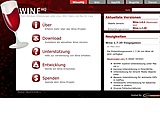 Wine is an implementation of the Windows API on top of X and Unix. It does not require Microsoft Windows, but can use native Windows DLLs if they are available. It provides both a development toolkit for porting Windows source code to Unix as well as a program loader, allowing many unmodified Windows programs to run on x86-based Unixes.
Wine is an implementation of the Windows API on top of X and Unix. It does not require Microsoft Windows, but can use native Windows DLLs if they are available. It provides both a development toolkit for porting Windows source code to Unix as well as a program loader, allowing many unmodified Windows programs to run on x86-based Unixes.
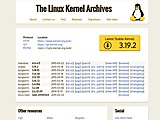 Linux is a mostly POSIX-compliant Unix-inspired operating system kernel, originally implemented by Linus Torvalds and now maintained as an international project. It's the base and common namegiver to a wide array of Linux distributions. The kernel provides all modern Unix-y features, like true process multitasking, virtual memory, virtual and clustered filesystem support, complex networking and extensive support for various hardware and machine platforms.
Linux is a mostly POSIX-compliant Unix-inspired operating system kernel, originally implemented by Linus Torvalds and now maintained as an international project. It's the base and common namegiver to a wide array of Linux distributions. The kernel provides all modern Unix-y features, like true process multitasking, virtual memory, virtual and clustered filesystem support, complex networking and extensive support for various hardware and machine platforms.
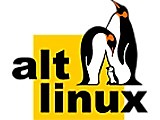 ALT is a set of Linux distributions based on Sisyphus, an APT-enabled RPM package repository that aims to achieve feature completeness, usability, and security in a sensible and manageable mixture.
ALT is a set of Linux distributions based on Sisyphus, an APT-enabled RPM package repository that aims to achieve feature completeness, usability, and security in a sensible and manageable mixture.
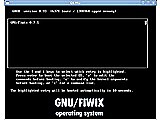 Fiwix is an operating system kernel written from scratch, based on the UNIX architecture and fully focused on being POSIX compatible. It is designed and developed mainly as a hobby OS and, since it serves also for educational purposes, the kernel code is kept as simple as possible for the benefit of readers or students. It runs on the i386 hardware platform and is compatible with a good base of existing GNU applications.
Fiwix is an operating system kernel written from scratch, based on the UNIX architecture and fully focused on being POSIX compatible. It is designed and developed mainly as a hobby OS and, since it serves also for educational purposes, the kernel code is kept as simple as possible for the benefit of readers or students. It runs on the i386 hardware platform and is compatible with a good base of existing GNU applications.
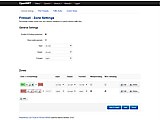 OpenWRT is a Linux distribution for wireless routers and low-resource embedded devices. It provides a coherent base system for different plattforms, various hardware and firmware drivers, and a Debian-style packaging system for application and add-on packages. The JSON-RPC based admin web interface LuCI makes configuration very user-friendly, but keeps the similar SSH and command line UCI interface and /etc files accessible. With its own PROCD system event daemon it can immediately respond to up
OpenWRT is a Linux distribution for wireless routers and low-resource embedded devices. It provides a coherent base system for different plattforms, various hardware and firmware drivers, and a Debian-style packaging system for application and add-on packages. The JSON-RPC based admin web interface LuCI makes configuration very user-friendly, but keeps the similar SSH and command line UCI interface and /etc files accessible. With its own PROCD system event daemon it can immediately respond to up
 The OpenBSD project produces a free, multi-platform 4.4BSD-derived UNIX-like operating system. Emphasizing portability, standardization, coherency, correctness, proactive security and integrated cryptography. It comes with almost 9000 software package in its ports, including a custom X11 environment (Xenocara), desktop environments, web and multimedia applications, compilers and programming languages. It also harbours the OpenBSD-maintained software projects OpenSSH, LibreSSL, OpenIKED, OpenBGPD
The OpenBSD project produces a free, multi-platform 4.4BSD-derived UNIX-like operating system. Emphasizing portability, standardization, coherency, correctness, proactive security and integrated cryptography. It comes with almost 9000 software package in its ports, including a custom X11 environment (Xenocara), desktop environments, web and multimedia applications, compilers and programming languages. It also harbours the OpenBSD-maintained software projects OpenSSH, LibreSSL, OpenIKED, OpenBGPD
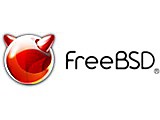 FreeBSD is an operating system and a major BSD distribution, which focuses on stability, performance, cutting-edge features and security. It's both UNIX® and Linux-compatible, ports a wide range of applications (24000), is suitable for server, embedded and desktop use. Has robust networking capabilities, cross-platform support, hardware and KMS/drm2 video drivers, hardware and network virtualization support, jails, dtrace, capsicum, understands ZFS and other filesystems, and simple installation
FreeBSD is an operating system and a major BSD distribution, which focuses on stability, performance, cutting-edge features and security. It's both UNIX® and Linux-compatible, ports a wide range of applications (24000), is suitable for server, embedded and desktop use. Has robust networking capabilities, cross-platform support, hardware and KMS/drm2 video drivers, hardware and network virtualization support, jails, dtrace, capsicum, understands ZFS and other filesystems, and simple installation
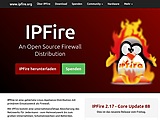 IPFire is a Linux firewall distribution that is built from source and comes with lots of additional features. It is easy to set up and administer. It features a firewall with stateful inspection, a content filtering engine, traffic control (QoS), VPN technology, and a lot of logging.
IPFire is a Linux firewall distribution that is built from source and comes with lots of additional features. It is easy to set up and administer. It features a firewall with stateful inspection, a content filtering engine, traffic control (QoS), VPN technology, and a lot of logging.
 OSHI is a free JNA-based (native) Operating System and Hardware Information library for Java. It does not require the installation of any additional native libraries and aims to provide a cross-platform implementation to retrieve system information, such as OS version, processes, memory and CPU usage, disks and partitions, devices, sensors, etc.
OSHI is a free JNA-based (native) Operating System and Hardware Information library for Java. It does not require the installation of any additional native libraries and aims to provide a cross-platform implementation to retrieve system information, such as OS version, processes, memory and CPU usage, disks and partitions, devices, sensors, etc.
 UBOS is a distro that aims to make it 10x easier to run server-side apps for yourself, or for your family, on hardware you own. It does by providing single-command web application install, uninstall, backup/restore and systems upgrade, including all server configuration, database provisioning, data migration etc. UBOS now also provides single-command network configuration, including DHCP, mDNS, DNS, firewall, masquerading and integration with Letsencrypt. Current supported platforms: x86, Raspb
UBOS is a distro that aims to make it 10x easier to run server-side apps for yourself, or for your family, on hardware you own. It does by providing single-command web application install, uninstall, backup/restore and systems upgrade, including all server configuration, database provisioning, data migration etc. UBOS now also provides single-command network configuration, including DHCP, mDNS, DNS, firewall, masquerading and integration with Letsencrypt. Current supported platforms: x86, Raspb
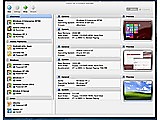 VirtualBox is a full x86 hardware virtualizer, suitable for server, desktop and embedded usage. It's extremely feature-rich, emulates lots of individual and alternative hardware and devices, supports different virtual machine disk formats, it's cross-platform and supports ancient and current Windows versions, DOS systems, BSD, Solaris and OS/2 as guest operating system.
VirtualBox is a full x86 hardware virtualizer, suitable for server, desktop and embedded usage. It's extremely feature-rich, emulates lots of individual and alternative hardware and devices, supports different virtual machine disk formats, it's cross-platform and supports ancient and current Windows versions, DOS systems, BSD, Solaris and OS/2 as guest operating system.
 OpenMPTCProuter is a solution to aggregate and encrypt (and can obfuscate) multiple internet connections and terminates it over any VPS which make clients benefit security, reliability, net neutrality, as well as dedicated public IP. The aggregation is based on Multipath TCP (MPTCP), which is ISP, WAN type, and latency independent "whether it was Fiber, VDSL, SHDSL, ADSL or even 4G", different scenarios can be configured to have either aggregation or failover based on MPTCP. Aggregation via Mu
OpenMPTCProuter is a solution to aggregate and encrypt (and can obfuscate) multiple internet connections and terminates it over any VPS which make clients benefit security, reliability, net neutrality, as well as dedicated public IP. The aggregation is based on Multipath TCP (MPTCP), which is ISP, WAN type, and latency independent "whether it was Fiber, VDSL, SHDSL, ADSL or even 4G", different scenarios can be configured to have either aggregation or failover based on MPTCP. Aggregation via Mu
 ReactOS is a free and open source operating system written from scratch. It's design is based on Windows in the same way Linux is based on Unix, however ReactOS is not Linux. ReactOS looks and feels like Windows, is able to your run Windows software and your Windows drivers, and is familiar for Windows users.
ReactOS is a free and open source operating system written from scratch. It's design is based on Windows in the same way Linux is based on Unix, however ReactOS is not Linux. ReactOS looks and feels like Windows, is able to your run Windows software and your Windows drivers, and is familiar for Windows users.
 FreeDOS is a complete, free, DOS-compatible operating system that you can use to play classic DOS games, run legacy business software, or develop embedded systems. Any program that works on MS-DOS should also run on FreeDOS. It doesn’t cost anything to download and use FreeDOS. You can also share FreeDOS for others to enjoy! And you can view and edit our source code, because all FreeDOS programs are distributed under the GNU General Public License or a similar open source software license.
FreeDOS is a complete, free, DOS-compatible operating system that you can use to play classic DOS games, run legacy business software, or develop embedded systems. Any program that works on MS-DOS should also run on FreeDOS. It doesn’t cost anything to download and use FreeDOS. You can also share FreeDOS for others to enjoy! And you can view and edit our source code, because all FreeDOS programs are distributed under the GNU General Public License or a similar open source software license.
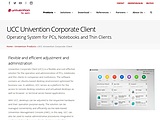 Univention Corporate Client (UCC) is a flexible and efficiently manageable operating system for PCs, notebooks, and thin clients in companies and institutions. The software contains a Linux-based desktop environment optimized for business use. It allows desktops to be adapted to hardware and intended applications. In addition, it can be managed conveniently and efficiently via a Web-based console. In comparison to other systems, it guarantees integrated administration procedures for users, clien
Univention Corporate Client (UCC) is a flexible and efficiently manageable operating system for PCs, notebooks, and thin clients in companies and institutions. The software contains a Linux-based desktop environment optimized for business use. It allows desktops to be adapted to hardware and intended applications. In addition, it can be managed conveniently and efficiently via a Web-based console. In comparison to other systems, it guarantees integrated administration procedures for users, clien
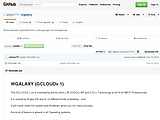 GCLOUD v.1 (WGALAXY) is an operating system based on the unix architecture and implemented in CHDollar Technology and C/C++. It is invented by wilmix jemin j IN CHDOLLAR and C/C++ Technology at 2016 for WSIT Professionals , clinet companies, etc It is ranked as A type OS due to 12 different kinds of Advanced desktop with cloud computing. We also use JAVA Technology to construct utilities . It is designed and developed mainly for companies, Industries,clients,Professionals, and WSIT/JAVA /
GCLOUD v.1 (WGALAXY) is an operating system based on the unix architecture and implemented in CHDollar Technology and C/C++. It is invented by wilmix jemin j IN CHDOLLAR and C/C++ Technology at 2016 for WSIT Professionals , clinet companies, etc It is ranked as A type OS due to 12 different kinds of Advanced desktop with cloud computing. We also use JAVA Technology to construct utilities . It is designed and developed mainly for companies, Industries,clients,Professionals, and WSIT/JAVA /
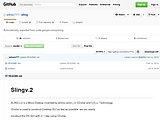 SLING v.1 is an operating system based on the unix architecture and implemented in CDollar Technology and C/C++. It is invented by wilmix jemin j IN CDOLLAR and C/C++ Technology at 2016 for WSIT Professionals CDollar is used to construct Desktop GUI as fast as possible. we can easily construct the OS GUI with in 1 day using CDollar. Features of SLINGv.1 ----------------------- a) It never crash b) It is fast to connect internet and Userfriendly. c) SLING DESKTOP(VISUAL DEKTOP) will be in
SLING v.1 is an operating system based on the unix architecture and implemented in CDollar Technology and C/C++. It is invented by wilmix jemin j IN CDOLLAR and C/C++ Technology at 2016 for WSIT Professionals CDollar is used to construct Desktop GUI as fast as possible. we can easily construct the OS GUI with in 1 day using CDollar. Features of SLINGv.1 ----------------------- a) It never crash b) It is fast to connect internet and Userfriendly. c) SLING DESKTOP(VISUAL DEKTOP) will be in
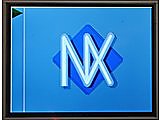 NuttX is a real-time operating system. It strives to be lean, POSIX-compliant and portable. It runs on ARM, Atmel AVR, x86, MIPS, Hitachi and Zilog CPUs. It's modular, very configurable, scalable, is pre-emptive, provides core task management, FIFO and round-robin scheduling, realtime support, priority inheritance, tickless operation, POSIX/ANSI and VxWorks task controls, has message queues, semaphores, timers, signals, pthreads, environment variables, virtual filesystem support, BSD sockets, MM
NuttX is a real-time operating system. It strives to be lean, POSIX-compliant and portable. It runs on ARM, Atmel AVR, x86, MIPS, Hitachi and Zilog CPUs. It's modular, very configurable, scalable, is pre-emptive, provides core task management, FIFO and round-robin scheduling, realtime support, priority inheritance, tickless operation, POSIX/ANSI and VxWorks task controls, has message queues, semaphores, timers, signals, pthreads, environment variables, virtual filesystem support, BSD sockets, MM
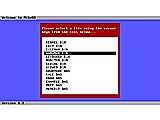 MikeOS is an operating system for x86 PCs, written in assembly language. It is a learning tool to show how simple 16-bit, real-mode OSes work, with well-commented code and extensive documentation. It features a text-mode dialog and menu driven interface, a BASIC interpreter, several third-party programs and the ability to boot from a floppy disk, CD-ROM or USB key.
MikeOS is an operating system for x86 PCs, written in assembly language. It is a learning tool to show how simple 16-bit, real-mode OSes work, with well-commented code and extensive documentation. It features a text-mode dialog and menu driven interface, a BASIC interpreter, several third-party programs and the ability to boot from a floppy disk, CD-ROM or USB key.
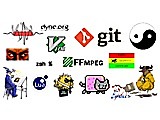 ZShaolin unleashes the power of GNU/Linux on your Android phone or tablet by installing a small and powerful shell environment. It comes with applications to edit images, audio and video using batch scripts one can write and upload. It does not require rooting, not even an Internet connection to work.
ZShaolin unleashes the power of GNU/Linux on your Android phone or tablet by installing a small and powerful shell environment. It comes with applications to edit images, audio and video using batch scripts one can write and upload. It does not require rooting, not even an Internet connection to work.
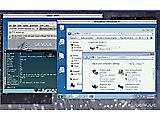 The Genode operating-system framework provides a unified application interface over different microkernel and hypervisor systems. It's a slim references implementations that runs atop Linux, L4ka::Pistachio, L4/Fiasco, OKL4, NOVA, Fiasco.OC, Codezero, and a custom kernel for ARM SoCs. Genode is designed for dynamic workload distribution while separating operation priviliges for rubustness.
The Genode operating-system framework provides a unified application interface over different microkernel and hypervisor systems. It's a slim references implementations that runs atop Linux, L4ka::Pistachio, L4/Fiasco, OKL4, NOVA, Fiasco.OC, Codezero, and a custom kernel for ARM SoCs. Genode is designed for dynamic workload distribution while separating operation priviliges for rubustness.
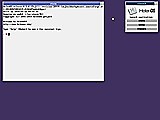 HelenOS is a microkernel-based operating system written completely from scratch. It is not UNIX-like and does not imitate any other OS. It runs on 7 different CPU architectures (IA-32, AMD-64, ARM, MIPS, PowerPC, SPARC, Itanium), supports SMP, networking, USB, sound and has its own original GUI.
HelenOS is a microkernel-based operating system written completely from scratch. It is not UNIX-like and does not imitate any other OS. It runs on 7 different CPU architectures (IA-32, AMD-64, ARM, MIPS, PowerPC, SPARC, Itanium), supports SMP, networking, USB, sound and has its own original GUI.
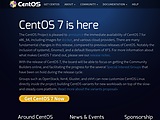 CentOS is an enterprise Linux distribution based on the sources from Red Hat Enterprise Linux. CentOS conforms with Red Hat's redistribution policy and aims to be 100% binary compatible. Each CentOS version is supported for 10 years (by means of security updates). A new CentOS version is released every 2 years and each CentOS version is regularly updated (every 6 months) to support newer hardware.
CentOS is an enterprise Linux distribution based on the sources from Red Hat Enterprise Linux. CentOS conforms with Red Hat's redistribution policy and aims to be 100% binary compatible. Each CentOS version is supported for 10 years (by means of security updates). A new CentOS version is released every 2 years and each CentOS version is regularly updated (every 6 months) to support newer hardware.
|